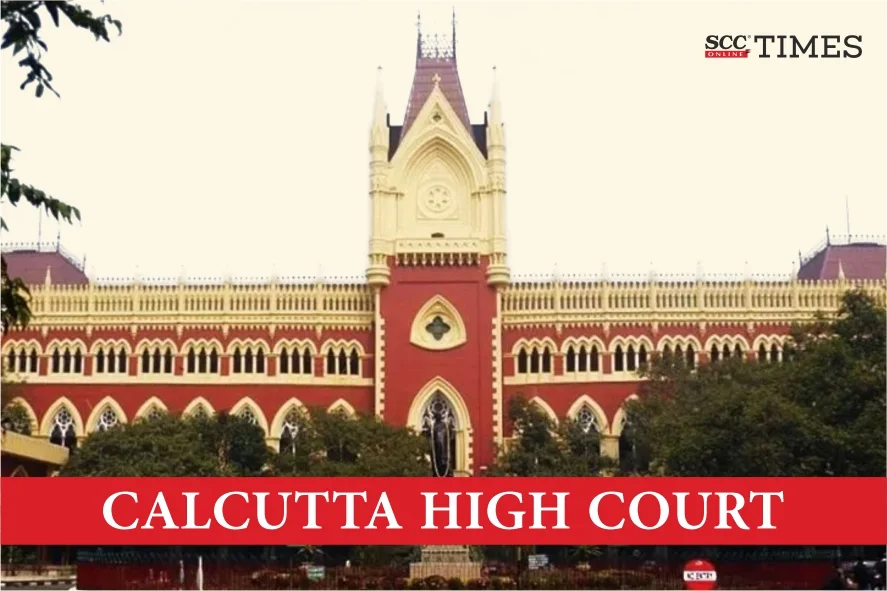Calcutta High Court: An appeal was filed by the wife (appellant) being aggrieved by the judgment and decree passed by the Additional District Judge Andaman and Nicobar Islands, Port Blair on 24-02-2020 in an appeal filed by husband (respondent) wherein the First Appellate Court reversed the judgment of the Trial Court that had dismissed the husband’s suit for defamation. Supratim Bhattacharya, J., held that the notices amounted to defamation and upheld appellant’s right to damages, however, it modified the quantum of damages from Rs. 2,00,000 to Rs. 1,00,000, considering proportionality and the appellant’s financial status.
The dispute stemmed from a long-standing matrimonial discord between the appellant and the respondent. The couple was married on 02-03-1994 and had a son. While the wife was employed as a Draughtswoman in the APWD, Port Blair, the husband worked as an Assistant Engineer (Electrical) with the Port Blair Municipal Council. The relationship deteriorated over time, culminating in a matrimonial suit filed by the husband on grounds of cruelty and desertion. Though the Trial Court initially decreed the suit in husband’s favour, the judgment was reversed by a Division Bench of the High Court which held that the marriage still subsisted.
During the pendency of these proceedings and after the Appellate Court had upheld the subsistence of the marriage, the wife published two public notices in “The Daily Telegram” through her advocate. These notices warned the public, claiming that the husband, despite the subsisting marriage, was attempting to marry another woman. The content of the notice stated that any such second marriage would be illegal and void. Aggrieved by this, the husband filed a civil suit for damages and compensation for defamation against the wife Ananta and the editor of the newspaper.
The Court observed that the central issue for determination was whether the publication of notices dated 03-12-2008 and 05-12-2008 in the daily newspaper The Daily Telegram by the wife amounted to defamation of her husband. Referring to the essential elements of defamation under the law of torts namely that the statement must be defamatory, refer to the plaintiff, and be published, the Court reiterated that defamation injures a person’s reputation, which is considered property under the law. A defamatory statement, it stated, is one that lowers a person in the estimation of right-thinking members of society or exposes them to contempt, ridicule, or social isolation, regardless of the speaker’s intent.
The Court noted that, in this case, the wife admitted that the notices were published at her instruction, based on unverified information allegedly received from unnamed friends, claiming her husband was attempting to contract a second marriage while their marital bond legally subsisted. The Court found that the wife was unable to name either the alleged second bride or the source of the information and failed to provide any evidence supporting the accusation. The Court stated that the act of making such an allegation in a widely circulated newspaper, without substantiation, amounted to an unprovoked attack on the husband’s dignity and reputation, thereby fulfilling all the requirements of actionable defamation. It further observed that several witnesses had testified to the reputational harm suffered by the husband.
The Court held that although quantifying damage to reputation is difficult, under Indian tort law, general damages are presumed in cases where the defamatory words are actionable per se, as they were here. The Court recognized the right to live with dignity under Article 21 and stated that publication of such baseless and uncorroborated claims not only caused emotional distress but also harmed societal values. Accordingly, the Court reduced the damages awarded by the First Appellate Court from Rs. 2,00,000 to Rs. 1,00,000, considering the appellant’s employment status.
The Court further exonerated the newspaper editor, holding that he bore no responsibility for the content of paid notices. The Second Appeal was thus allowed in part, modifying the earlier decree, and directing the wife to pay Rs. 1,00,000 to the husband within three months.
[A v. R, 2025 SCC OnLine Cal 3841, decided on 11-04-2025]
Judgment by: Justice Supratim Bhattacharya
Advocates who appeared in this case :
For the Appellant: Mr. KMB Jayapal
For the Respondents: Mrs. Anjili Nag, Sr. Adv, Mr. Ajay Majhi


